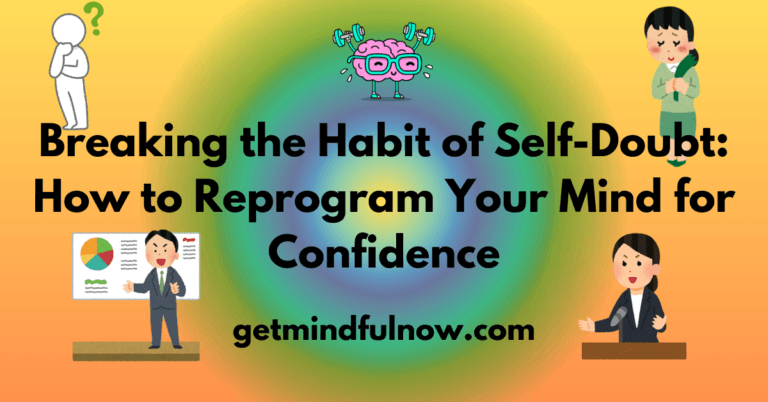If you’d told me years ago that I’d be writing about confidence today, I would have laughed it off, maybe with a nervous chuckle. Back then, I had what felt like zero confidence. My mind was a constant storm of “What will they think?” or “What if I mess up?” These questions haunted me before every presentation, every group discussion, even casual gatherings.
I remember the dread that would wash over me at the thought of speaking up. Many times, I even canceled presentations, losing grades and confidence at the same time. But even as I silently held back answers I knew were right, there was something deeper at play. The root of my anxiety went beyond these moments — it stretched back to a traumatic childhood and teen years that I’d avoided facing for far too long.
It took some honest inner work to start unraveling the self-doubt woven into my mind. Brain meditation techniques, especially intense practices that prune old mental wiring and encourage new neural pathways, were my lifeline. And with every breakthrough, I felt the weight of “I’m not good enough” begin to lift. Today, I want to share that journey — and show you how to reprogram your mind for confidence too. Because if I could do it, so can you.
Understanding Self-Doubt: The Psychological Roots

Before diving into practical strategies, it’s essential to understand why we feel self-doubt in the first place. According to research in psychology, self-doubt often stems from our early experiences and learned patterns of thinking. For me, years of unresolved trauma had created mental barriers around confidence. But self-doubt doesn’t always come from trauma. Sometimes, it arises from negative feedback, societal pressure, or simply the fear of being judged.
One book that helped me understand this deeply was “Mindset” by Carol Dweck. She explains that those with a fixed mindset believe their qualities are unchangeable, while those with a growth mindset view challenges as opportunities to learn and grow. It was a revelation. My constant fear of failure wasn’t because I wasn’t capable; it was because I hadn’t yet allowed myself to believe that I could change.
So the first step to reprogramming your mind for confidence? Start by understanding and accepting where your self-doubt comes from. This awareness alone is incredibly powerful.
Recognizing the Power of Brain Plasticity
In my journey, one of the most enlightening discoveries was the concept of brain plasticity — the idea that our brains are capable of rewiring themselves through intentional practices. In her book, “The Brain That Changes Itself”, Dr. Norman Doidge explores how mental exercises can reshape our thinking patterns. For me, meditation and visualization became critical tools to begin shifting my self-doubt toward confidence.

I would start each day with a meditational exercise and, after that imagine myself as the person I wanted to be — confident, calm, and self-assured. With each session, I could feel the tightness of my anxiety loosening, giving way to a sense of possibility. Little by little, these exercises helped me train my brain to respond differently in situations that once terrified me.
Building Confidence Through Small Wins
Another turning point was discovering the power of “small wins.” Confidence doesn’t happen overnight; it builds through small, consistent actions. I began by setting tiny, achievable goals for myself. It could be as simple as speaking up in a group meeting or saying “yes” to a casual gathering I’d typically avoid. Each time I followed through, it was like a small deposit into my confidence bank.
James Clear’s “Atomic Habits” sheds light on this beautifully, explaining how habits — even small ones — compound over time, creating a ripple effect. Celebrating these small wins helped shift my focus from perfection to progress, and that shift was pivotal.
The Role of the Thyroid: How Physical Health Impacts Mental Confidence
For a long time, I blamed my low energy and lack of confidence purely on my mental state. But then I discovered my thyroid health was part of the equation. The thyroid gland, responsible for regulating metabolism and energy, also affects mood and mental clarity. Hypothyroidism, or an underactive thyroid, can sometimes amplify feelings of low self-worth and anxiety.

Incorporating proper thyroid care, including a balanced diet, throat chakra meditations, and regular exercise, was a game-changer for me. As my thyroid levels stabilized, so did my energy — and surprisingly, my sense of confidence. I started feeling a newfound clarity that supported my mental efforts.
Reprogramming Self-Talk: Shifting Your Inner Dialogue
One of the hardest but most important shifts I made was in my self-talk. For years, I’d unconsciously told myself things like, “You’re not good enough,” or “You’ll mess up.” This constant negative dialogue was like a track on repeat. But by catching myself in these thoughts and consciously flipping them into positive affirmations, I began to build a new internal narrative.
Books like “The Power of Now” by Eckhart Tolle and “The Untethered Soul” by Michael Singer became my guides in recognizing and releasing the power of my thoughts. The simple act of replacing “I can’t” with “I’ll try” gave me a new level of freedom to explore and grow.
For a long time, I was terrified of making mistakes. I wanted to be perfect — or at least, to look that way. But part of reprogramming my mind was accepting that perfection doesn’t exist. Practicing radical acceptance (a concept from mindfulness) allowed me to let go of the need to have it all together. And ironically, this acceptance made me more authentic and confident because it freed me from the pressure of being flawless.
Benefits of Reprogramming for Confidence: What I Gained
Now that I’ve done the work, the benefits I’ve reaped are beyond what I imagined. Here are some of the biggest changes I’ve noticed:
- Improved Relationships: By being more confident, I’m able to connect with people without worrying so much about judgment.
- Career Progression: I no longer cancel presentations, or stare at my phone ringing. In fact, I even look forward to them because I know my worth and what I bring to the table.
- Better Physical Health: With my thyroid under control and my mind in a better state, my physical health has improved significantly.
- Greater Resilience: I no longer let setbacks define me. Instead, I see them as opportunities to grow and learn.
Reprogramming your mind isn’t an overnight fix, and it’s certainly not linear. But with consistent effort, patience, and a willingness to grow, it is absolutely possible to break the habit of self-doubt and cultivate lasting confidence.
Final Thoughts: Stepping into a Confident Future
My journey isn’t over, and neither is yours. But every day I feel more equipped to handle the challenges life throws my way. Confidence, I’ve learned, isn’t about never feeling afraid. It’s about trusting yourself enough to push through the fear. And as I’ve walked this path, I’ve come to realize that we’re all capable of so much more than we believe.

If you’re starting this journey, know that you don’t have to do it all at once. Begin with small steps. Challenge that one nagging doubt today. Make that one phone call. Say “yes” to the opportunity that scares you. With time and intentional effort, you’ll be amazed at how much you can grow.
Remember: Confidence is a skill, not a gift. And like any skill, you get better with practice. You’re stronger than your doubts, more capable than you know, and worthy of every opportunity life offers. So go ahead — take that first step and start rewriting your story.
Bonus: A Few Confidence-Building Resources
- Books: “Mindset” by Carol Dweck, “The Power of Now” by Eckhart Tolle, “Atomic Habits” by James Clear
- Practices: Daily affirmations, brain meditations, visualization exercises
- Health Tips: Get your thyroid checked if you’re struggling with energy or mood, and make small adjustments to your diet and exercise.








